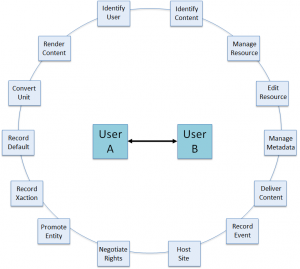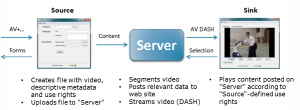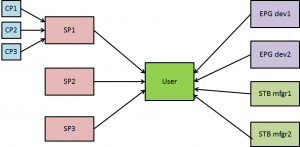| Previous chapter | Next section | Next chapter | |
| ToC | Digital Media For Machines | Doing Something For My Country | Frameworks For Digital Media |
Open Media Marketplace
In 2008 DMP began discussions on Open Media Marketplace (OMM), an environment where Users perform actions on Entities using Services provided by Service Providers. The following subset of OMM requirements should indicate where OMM would lead.
- OMM shall enable the provisioning of interoperable Services between OMM Users
- OMM shall support Basic Services
- OMM shall enable a Service Provider to combine several Basic Services into one Aggregated Service
- OMM shall enable different Providers to offer the same Basic Services and the same or partially overlapping Aggregated Services
- OMM shall enable the provisioning of interoperable Services between OMM Users
Figure 1 depicts a possible list of services that a user may need to provide services to another user.
Figure 1 – OMM services
In January 2010 MPEG issued a new Call for Proposals that included
- OMM requirements as proposed to MPEG at the London meeting (June-July 2009)
- Advanced IPTV Terminals (AIT) proposed by ITU-T
DMP members submitted a response to the call in April 2010 and contributed to the development of new parts 1-5 and part 5 of MPEG-M.
Open Connected TV
Open Connected TV (OCTV) seeks to enrich one-way TV services with two-way interoperable and multichannel content access and delivery. The OCTV Specification enables the creation and the OCTV software and accelerates the development of a broad market of products, content, services and applications that enrich access to and delivery of one-way TV services with two-way interoperable multichannel content.
Figure 1 shows the model OCTV chain that has been developed
Figure 2 – An OCTV chain
Currently DMP is considering a 4th phase, the development of a specification to enablea user to
- Access any service using a device (e.g. Set Top Box, Connected TV set, Mobile handset) purchased from any manufacturer
- Access any service using an EPG acquired from any developer
- Search EPG instances for content referenced in the EPG
- Purchase an object in an application or in an EPG used to access a service provider
- (A user to be authenticated by any service provider or EPG developer)
as depicted in the figure below where
CP: Conrtent Provider
SP: Service Provider
STB: Set Top Box
EPG: Electronic Program Guide
Figure 3 – DMP phase 4 reference model
| Previous chapter | Next section | Next chapter | |
| ToC | Digital Media For Machines | Doing Something For My Country | Frameworks For Digital Media |


